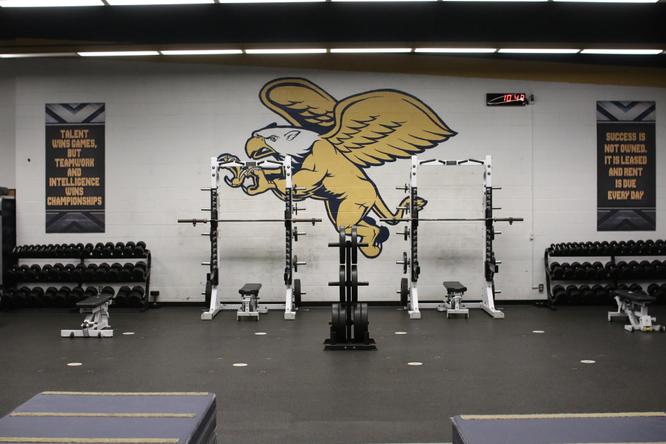Philosophy 
The primary goal of the strength and conditioning program is to minimize risk of injury by adequately preparing all athletes for the demands of competition. It is well established that effective training programs improve joint stability and joint range of motion, increase muscular strength and power, enhance movement mechanics, and increase energy system function. The end result is the ability to overcome the physical stress of competition.
The second goal of strength and conditioning program is to improve the performance capabilities of each athlete and contribute to the success of each team. This is accomplished by implementing movement training that is specific to sports and that challenge each athlete mentally and physically.
Training Principles
1. Sport-Specific Training
The purest form of training for any activity is the activity itself. To be effective, a training program must reproduce the functional movements and metabolic demands of the sport being trained for. Sport-specific training challenges athletes' to perform specific movements and movement patterns safely, efficiently and subconsciously; develops the appropriate energy systems; and promotes muscular adaptations that lead to superior sport performance.
2. Multiple Joint Movements
No single body part works in isolation during movement. The body works synergistically (muscles, joints and proprioceptors work together) to produce complex movements. Running, jumping, shooting and throwing all require multiple joint actions timed in synchronized neuromuscular recruitment patterns. Thus, integrated movements should be trained, not individual muscles, if the goal is to maximize function and performance.
3. Multiple Plane Movements
Movement in sport occurs in three planes- sagittal (forward-backward), frontal (side-to-side) and transverse (rotational) and combinations of all three. Resistance training should incorporate exercises and movement patterns that develop strength and efficiency in each plane. Movement training should emphasize acceleration (force production), deceleration (force reduction) and agility (change of direction skills) since these areas have the greatest impact on sport performance.
4. Ground-Based Movements
Most sport skills are initiated by applying force in to the ground, on one leg or two. The more force an athlete can apply against the ground, the faster they will accelerate, the higher they will jump and the more effective they will be in sport. Lifting exercises should be chosen to enhance this ability to generate force. Squatting (single and double-leg) and the Olympic movements (clean, snatch & jerk) are recognized as the best movements for this purpose. Plyometrics and sport-specific agility drills are also effective.
5. Explosive Training
The ability to generate force at high rates of speed (power) is crucial in sport. Training explosively, using ground-based, multiple joint movements trains the body to recruit fast motor units at high rates of speed. This, in turn, improves performance potential.
6. Periodization
Performance gains will eventually plateau and even diminish if the same training prescription is continually followed. Periodization is a scientifically proven model that uses different combinations of volume, load (intensity) and exercise specificity to progressively overload the body and bring about specific adaptations.
7. Recovery
No training program can be successful without a commitment to nutrition, rest and a healthy lifestyle. Decreases in performance can often be traced to a poor diet, poor sleep habits, and/or lack of recovery time. It is essential that athletes understand and apply regeneration techniques that accelerate recovery.
8. Character
Becoming the best possible athlete requires more than talent, consistent training and a commitment to nutrition. A foundation that includes resolve, discipline, courage, perseverance and selflessness is essential for true success. These attributes must be emphasized, developed and rewarded during training.
Internships
Internships are currently available for graduating seniors who have a desire to enter the profession of Strength and Conditioning. Our program is designed to be highly interactive with both athletes and coaches. Our interns level of initiative will determine exactly how much they get out of the internship. Interns are required to fulfill the job description set forth and complete projects as set up by the intern director and Canisius University. Overall, it is very comprehensive and designed to prepare interns for job market and an entrance level job.
A Student Intern should be committed to the profession of strength and conditioning; and as such, be willing and eager to participate in all facets of program development. A part of this responsibility is continued learning and a search for any information that can enhance the program. The student will learn to establish themselves as a coach among the athletes and will conduct him or herself accordingly. Developing a positive rapport with athletes, while maintaining a professional distance, is required. A student's actions and verbal communications are reflective of the Canisius program both socially and professionally. The student will treat all coaches, administrators, visitors, and athletes with the greatest respect; and always put forth a positive attitude.
The student will serve as a member of the strength and conditioning team. The student will report directly to the Director of Strength and Conditioning, and will work under the supervision of, and take direction from the strength and conditioning staff. The student will be expected to follow through to completion any responsibilities given to them by their supervisors. A working relationship will be maintained between the strength and conditioning staff that facilitates open communication between all parties.
External Links
Nutrition
Staff
Contact Us
